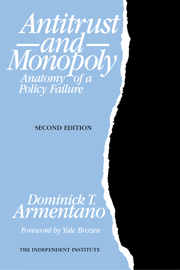Federal and state antitrust laws generally forbid any “monopolization” of commerce. Yet, ironically, the City of Vero Beach, Florida (where I live) has maintained a State authorized unregulated electric utility monopoly for decades. And like all government protected monopolies, the City’s electric utility rates (prices) to its captive customers have proven to be far higher than those charged by its nearest potential competitor.
Florida Power and Light, which serves adjacent geographic areas (and could serve Vero Beach) charges rates that are dramatically lower than Vero Beach Utilities. For example, FPL’s current total price including tax is $114.06 per 1,000 kwh while Vero Electric charges County customers $180.69 per 1,000 kwh, an incredible 58% more. Thus someone with an electric bill from the Vero Beach Utility monopoly for, say, $400 per month would pay only $253 to FPL for the very same product.
In antitrust law, that dollar price difference between the monopoly price and the competitive price is termed the monopoly “overcharge.” And if it is multiplied by the quantity of electricity consumed by the more than 34,000 thousand current customers of Vero Utilities, the total wealth loss to local residents over the years is seen to be truly staggering.
Normally in a private antitrust case involving monopoly, the injured plaintiffs would be able to sue the monopoly and attempt to collect three times the overcharge (“treble damages”) in a recovery.
Government sanctioned monopolies, however, are usually treated differently. Most are either exempt from antitrust law or, in the case of a private firm such as FPL, they are rate regulated by a regulatory commission (Public Service Commission) so that their prices reflect the cost of providing the service and allow a reasonable rate of return on investment.
Vero Beach Utilities, however, appears to have the best of all possible worlds...for itself and the City (which rakes off a 7% “profit” from the revenues). First, potential competitors cannot enter its market territory by law; second, it is apparently exempt from antitrust law and any threat of treble damages; and finally, its rates are NOT regulated by any state regulatory commission to ensure that they are “fair and reasonable.”
Most of this economic nonsense started back in 1978 when several State and Federal agencies sued to stop a referendum-authorized City of Vero Beach sale of its electric utility to FPL. Then in 1981 a notorious “territorial agreement” was crafted to divide up the electric grid between the City and FPL. (If this “division of market” agreement were done by private firms, it would be a per se violation of antitrust law.) Finally, in 1983, the Florida State legislature removed (“deregulation”!) the bulk of the Public Service Commission’s regulation of Vero’s electric monopoly, including rates.
Since then, customers of the City’s electric utility (61% of whom live outside the city and can’t even vote on these matters) have been simply at the mercy of whatever service and price structure the utility determines is appropriate. As one could predict, this has proven to be a recipe for massive inefficiency and price gouging.
There are several ways to reform fundamentally the current situation. One way is to simply require that the City of Vero Beach sell its utility operations to any willing buyer. A second alternative would be to end the territorial monopoly and simply allow customers to switch to a competitor. This latter proposal would create “competition” between electricity providers and would tend over time to lead to lower rates generally.
In addition, in order to encourage non-traditional suppliers of electric power, any and all supply restrictions on the production and sale of electricity should be removed. With legally open markets and a strong potential for competition, electric rates should decline to more fair and reasonable levels.








